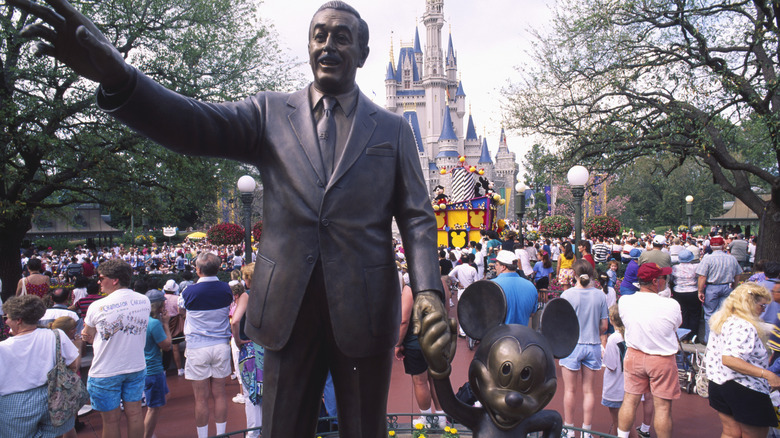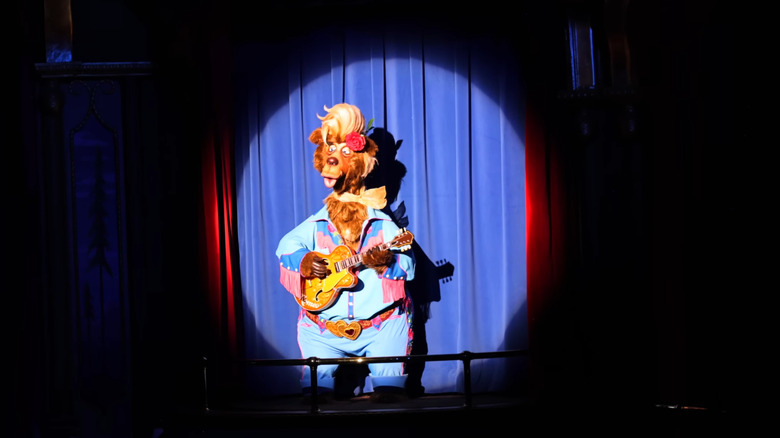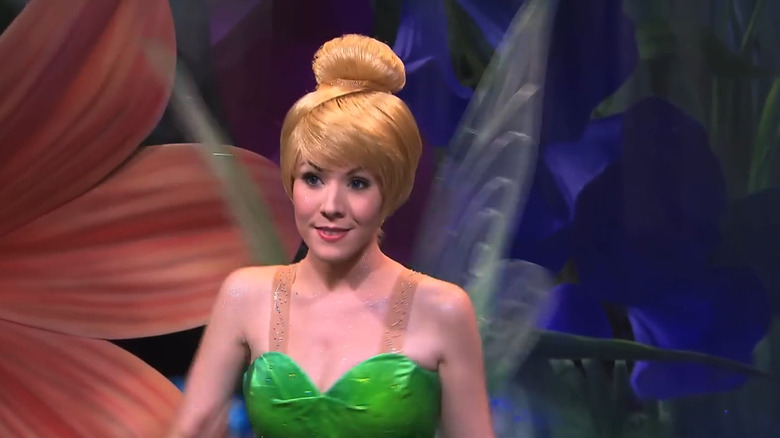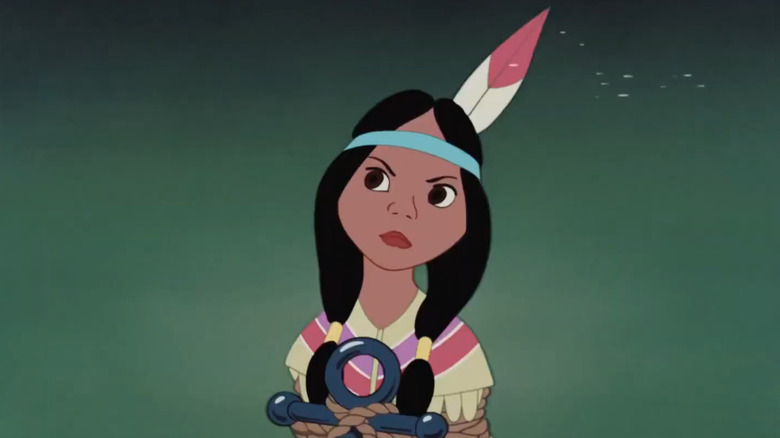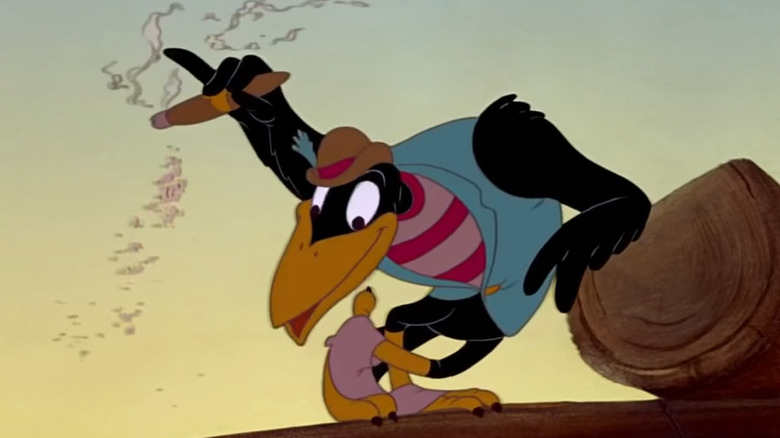Disney Cut Another Offensive Character For A Controversial Reason
The history of animation is fraught with portrayals, imagery, and iconography that hasn't aged well. The medium is over 100 years old, so naturally, what seemed acceptable and au currant when it first became popular now seems utterly outrageous, offensive, and even repugnant to some viewers. Companies have gone on to handle their storied legacies in different ways.
To wit, Warner Brothers has released collections of their more controversial Looney Tunes outings with a disclaimer that explains the shorts stem from a different era, though the material wasn't acceptable even back then. Disney+ has streamed some of the studio's older shorts with a similar disclaimer. But the House of Mouse has gone one step further on occasion, removing characters and properties from their products and parks. One of the most prominent examples has been refurbing the "Song of the South"-inspired Splash Mountain into Tiana's Bayou Adventure in their theme parks.
In the past year, Disney renamed another of its theme park characters from a well-known attraction. While this change may be much more obscure than the switch-ups it's made to Splash Mountain, it still shows off the company's willingness to edit its history to increase the happiness of its guests — a prospect that doesn't always work out for them.
Disney had to remove and rename this offensive character in 2024
The name "Liver Lips McGrowl" might not be instantly recognizable to Disney fans, but the character has been a part of the Country Bear Jamboree attraction since it launched in 1971. However, in the Disney World version of the attraction, Liver Lips has been transformed into Romeo McGrowl. It's a move that's allegedly intended to display sensitivity toward alcoholics, for whom "liver lips" may be an offensive term, according to Disney's Inside the Magic blog. Other sources suggest that it's a racist disparagement against Black people in some vernaculars. There were loose Reddit rumors that Liver Lips/Romeo would no longer be a character roaming the parks' grounds, but no proof has been offered on that accord.
It's worth noting, however, that jugs emblazoned with x's can be seen littering the bears' stage during certain acts, and one of the Five Bears can be seen blowing one. On top of that, this is just one more refurb in an attraction that's undergone several overhauls. In 2012, the bears' setlist was changed to reference actual country music hits. The attraction closed at Disneyland in 2012. In January 2024, the Walt Disney World version underwent an overhaul that wasn't simply for another refurbishing. On reopening in the summer of 2024, the bears now sing countrified versions of songs from Disney films, with only "Come Again" and The Five Bear Rugs' jam intact from the original act. This refurb also came about in concert with the Splash Mountain redesign. With all of this interpark upheaval, rumors began to spread that Romeo isn't the only character who's recently been spirited away from center stage.
Did Disney really 'cancel' Peter Pan's Tinker Bell for being controversial?
Interestingly enough, rumors have spread that a much more famous character has been removed from the parks as a meet and greet character — Tinker Bell from "Peter Pan." The whispers claimed that her jealous attitude toward Wendy in the film meant she was a negative role model and that Disney was "cancelling" the character. So, did Disney Parks rid themselves of Tinker Bell? The answer is no. While she isn't available as a meet and greet character at Disney World, fans can book a meet and greet with her at Disneyland. You can also spot her in Disney World's parades and as a character setting off the park's evening-ending fireworks display. It's common for Disney World to rotate available characters at its meet and greets, they report, and ergo it's likely she'll be back soon. On top of that, A Disney spokesperson gave Reuters a statement that declared the claim "completely false."
Where did the erroneous rumor get started? Reuters points readers toward an Instagram post that edits a The Street article to trumpet Tinker Bell's cancellation. The original article does not describe the character as being cancelled, but mentions that she is currently under scrutiny from the company's "Stories Matter" team for her vain ways and obsession with Peter Pan. But the worry hasn't been strong enough to entirely erase the character from the parks.
Disney's choice to keep Tinker Bell makes sense, because in recent decades the company's put major effort into rehabilitating the spunky little pixie's reputation. She's been a central character in a set of six direct-to-DVD films released in the late-2000s through the mid-2010s that give her a voice and take place in her native Pixie Hollow. Tinker Bell even had a dedicated meet and greet location inspired by those movies at Disney World. While Tink's legacy appears to be safe, some characters have been locked away in the Disney vault — perhaps forever.
Disney has cut more offensive characters than you might think
Though Tinker Bell's rumored and "Liver Lips" McGrowl's actual excision from Disney Parks stand as examples of the company's changing perspective on what makes an entertaining day out for families, their films have not been exempt from self-censure and appraisement. Among other classic short films, "Dumbo," "Fantasia," "Peter Pan," and, notoriously, "Song of the South" have had their characters changed or removed either from re-releases or streaming versions. "Song of the South," naturally, is unavailable in its entirety, and with Splash Mountain gone, its characters are generally verboten in the Disney universe.
The affected characters include the crow chorus from "Dumbo," Tiger Lily and her tribe from "Peter Pan," and Sunflower, a centaur in the Pastoral Symphony section of "Fantasia." While the variety of reasons and ways in which these characters have been removed or modified and their places in Disney lore differ, they've all been censored or had their appearance changed in one way or another.
Disney continues to face controversies over offensive characters
How did the removal or changing of these characters take place? In the case of "Dumbo," the controversial crows have long been called racist caricatures for their minstrel show-like behavior. The head of the crow clique — the only one voiced by a white actor — was even named Jim Crow, a reference to a blackface character who eventually supplied the name for Jim Crow laws. He was renamed to Jim "Dandy" Crow sometime in the 1950s, but the damage was already done. While some, including Black Disney legend Floyd Norman, have defended the characters, Jim and his feathered friends are not included in the cast of the 2019 live-action "Dumbo" remake. The film streams untouched on Disney+ and is restricted to viewers 6 or older.
"Fantasia" was edited in the 1960s to remove Sunflower, a dark-skinned centaur who is seen acting as a ladies' maid to several other white centaurs. Her stereotypical look was enough to raise alarm bells among Disney's braintrust, and Walt Disney himself okayed this trim before the film re-aired as a "The Wonderful World of Disney" episode in 1963. While it did air intact in 1966, the character was fully removed in 1969 for the film's theatrical re-release, and from every version that's streamed, aired, or been re-released since.
Some airings of the equally controversial "Peter Pan" have trimmed the song "What Made the Red Man Red?" and it also streams with a warning on Disney+. But interestingly enough, Tiger Lily and her tribe were given a makeover in August at Disney World's Magic Kingdom version of Peter Pan's Flight. They were rethemed to be more accurate to Native American culture. Disneyland announced that they will retheme their version of the ride soon.
Most notorious of all, of course, is the case of "Song of the South," which has never been on home video, DVD, or released to streaming. While you might hear "Zip-a-Dee-Doo-Dah" at the parks, the film has remained firmly in the Disney vault since 1986. Will "Song of the South" ever surface? Not as long as Bob Iger is in charge. He told a group of shareholders in 2020 that the film will never be formally released again.
It seems controversy and Disney will always go hand-in-hand as cultural mores change and people grow. The only constant is evolution — and time will tell how cultural standards change public perceptions.
